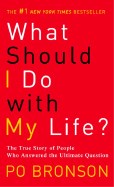Day jobs
April 22, 2010
I've been thinking a lot today about "day jobs" and what that concept means to people. For some, it's what they do, it's what they're good at, and for lack of a better term, it's their lives. For others, it's something they use, to pay the bills while they wait for something better to come along, or to fund projects they're working on outside of work, that don't make enough money to survive on.
I've been thinking a lot today about "day jobs" and what that concept means to people. For some, it's what they do, it's what they're good at, and for lack of a better term, it's their lives. For others, it's something they use, to pay the bills while they wait for something better to come along, or to fund projects they're working on outside of work, that don't make enough money to survive on.
Actor/director Crispin Glover is in Milwaukee today, and is an interesting case study for the 'day job' concept. Most people recognize Glover from his quirky roles in big Hollywood films, but less are aware of what he does off camera. As a director, Glover's films will never get Hollywood support and distribution because of their subject matter, but that's ok with him. In fact, he has very specific criteria for how his films are presented: For one, he must be present any time one of his films are shown. At these events, Glover does a brief slideshow, screens his current film, holds a lengthy Q&A about the film, and then stands in the lobby and personally greets every attendee.
It doesn't take a ton of knowledge about the cost of film production to understand that this is a very expensive effort. For Glover, it's ok, because that's what he uses his day job for - to fund the production and screening of his own films, exactly the way he wants to.
While all of us don't have million dollar day jobs to fund our personal interests, it's perhaps more interesting to make note of those that accomplish great things on much smaller budgets. Here at 800-CEO-READ, there's a good amount of entrepreneurial spirit in the house, and whether we or our families or friends are using monetary resources to pay for projects, the important thing is to acknowledge the drive to produce those projects.
In ending, I feel it's appropriate to point out Jack Covert's recent recap of Po Bronson's What Should I Do With My Life? for Penguin's Business Beat. How we answer that question can give us a great deal of insight into what we do, and why we do it. It's OK to have a day job. It's OK to not do your "passion" full-time. If you think creatively, and plan accordingly, you can find all sorts of enjoyment, resources, and opportunities that lie within any number of things done during the day, or after business hours. The important thing is to not waste time, but take every chance you can to find something fulfilling within everything you do.


